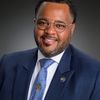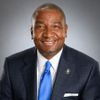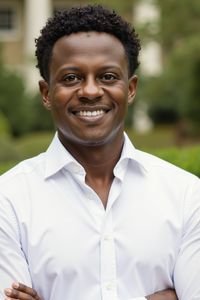Quentin Anthony Anderson
Quentin Anthony Anderson (Democratic Party) ran in a special election to the Louisiana State Senate to represent District 14. He lost in the special primary on February 15, 2025.
Biography
Quentin Anderson was born in San Francisco, California. He earned a high school diploma from McKinley High School, a bachelor's degree from Louisiana Tech University in 2010, and a J.D. from Louisiana State University in 2013. Anderson's professional experience includes working as an executive chairman of The Justice Alliance, founder/creative director of marketing firm Anderson Creative, and communications director for The Appleseed Foundation. He has been affiliated with Alpha Phi Alpha Fraternity, Inc.[1][2]
Elections
2025
See also: Louisiana state legislative special elections, 2025
Louisiana elections use the majority-vote system. All candidates compete in the same primary, and a candidate can win the election outright by receiving more than 50 percent of the vote. If no candidate does, the top two vote recipients from the primary advance to the general election, regardless of their partisan affiliation.
Nonpartisan primary election
Special nonpartisan primary for Louisiana State Senate District 14
Larry Selders won election outright against Carolyn Hill and Quentin Anthony Anderson in the special primary for Louisiana State Senate District 14 on February 15, 2025.
Candidate | % | Votes | ||
| ✔ |  | Larry Selders (D) | 62.4 | 4,153 |
| Carolyn Hill (D) | 20.4 | 1,355 | ||
 | Quentin Anthony Anderson (D) | 17.3 | 1,149 | |
| Total votes: 6,657 | ||||
 = candidate completed the Ballotpedia Candidate Connection survey. = candidate completed the Ballotpedia Candidate Connection survey. | ||||
| If you are a candidate and would like to tell readers and voters more about why they should vote for you, complete the Ballotpedia Candidate Connection Survey. | ||||
Do you want a spreadsheet of this type of data? Contact our sales team. | ||||
Endorsements
Ballotpedia did not identify endorsements for Anderson in this election.
2024
See also: Louisiana's 6th Congressional District election, 2024
Louisiana elections use the majority-vote system. All candidates compete in the same primary, and a candidate can win the election outright by receiving more than 50 percent of the vote. If no candidate does, the top two vote recipients from the primary advance to the general election, regardless of their partisan affiliation.
Nonpartisan primary election
Nonpartisan primary for U.S. House Louisiana District 6
Cleo Fields won election outright against Elbert Guillory, Quentin Anthony Anderson, Peter Williams, and Wilken Jones Jr. in the primary for U.S. House Louisiana District 6 on November 5, 2024.
Candidate | % | Votes | ||
| ✔ |  | Cleo Fields (D) | 50.8 | 150,323 |
 | Elbert Guillory (R) | 37.7 | 111,737 | |
 | Quentin Anthony Anderson (D)  | 8.0 | 23,811 | |
 | Peter Williams (D) | 2.1 | 6,252 | |
| Wilken Jones Jr. (D) | 1.3 | 3,910 | ||
| Total votes: 296,033 | ||||
 = candidate completed the Ballotpedia Candidate Connection survey. = candidate completed the Ballotpedia Candidate Connection survey. | ||||
| If you are a candidate and would like to tell readers and voters more about why they should vote for you, complete the Ballotpedia Candidate Connection Survey. | ||||
Do you want a spreadsheet of this type of data? Contact our sales team. | ||||
Withdrawn or disqualified candidates
- Garret Graves (R)
- Scott Sonnier (R)
Endorsements
Anderson received the following endorsements.
2020
See also: City elections in Baton Rouge, Louisiana (2020)
Louisiana elections use the majority-vote system. All candidates compete in the same primary, and a candidate can win the election outright by receiving more than 50 percent of the vote. If no candidate does, the top two vote recipients from the primary advance to the general election, regardless of their partisan affiliation.
General election
General election for East Baton Rouge Metro Council District 10
Carolyn Coleman defeated Jay Gaudet in the general election for East Baton Rouge Metro Council District 10 on December 5, 2020.
Candidate | % | Votes | ||
| ✔ | Carolyn Coleman (D) | 62.9 | 3,567 | |
| Jay Gaudet (D) | 37.1 | 2,102 | ||
| Total votes: 5,669 | ||||
 = candidate completed the Ballotpedia Candidate Connection survey. = candidate completed the Ballotpedia Candidate Connection survey. | ||||
| If you are a candidate and would like to tell readers and voters more about why they should vote for you, complete the Ballotpedia Candidate Connection Survey. | ||||
Do you want a spreadsheet of this type of data? Contact our sales team. | ||||
Nonpartisan primary election
Nonpartisan primary for East Baton Rouge Metro Council District 10
The following candidates ran in the primary for East Baton Rouge Metro Council District 10 on November 3, 2020.
Candidate | % | Votes | ||
| ✔ | Carolyn Coleman (D) | 27.4 | 2,796 | |
| ✔ | Jay Gaudet (D) | 18.5 | 1,884 | |
 | Quentin Anthony Anderson (D)  | 17.4 | 1,778 | |
 | Eugene Collins (D) | 16.9 | 1,727 | |
 | Davante Lewis (D) | 12.5 | 1,274 | |
| Andrea Cosey (D) | 5.8 | 589 | ||
| Markeda Cottonham (D) | 1.5 | 155 | ||
| Total votes: 10,203 | ||||
 = candidate completed the Ballotpedia Candidate Connection survey. = candidate completed the Ballotpedia Candidate Connection survey. | ||||
| If you are a candidate and would like to tell readers and voters more about why they should vote for you, complete the Ballotpedia Candidate Connection Survey. | ||||
Do you want a spreadsheet of this type of data? Contact our sales team. | ||||
Withdrawn or disqualified candidates
- Will Chatman Sr. (D)
Campaign themes
2025
Ballotpedia survey responses
See also: Ballotpedia's Candidate Connection
Quentin Anthony Anderson did not complete Ballotpedia's 2025 Candidate Connection survey.
2024
Video for Ballotpedia
| Video submitted to Ballotpedia Released April 6, 2024 |
Quentin Anthony Anderson completed Ballotpedia's Candidate Connection survey in 2024. The survey questions appear in bold and are followed by Anderson's responses.
| Collapse all
- In Louisiana, too many of our politicians are bought and paid for - that's why no matter who you vote for, Democrat or Republican, the same agenda is pushed and the same concerns of the voters get ignored. We've gotten too comfortable with low expectations and our political leaders take advantage of that. We can do better than bought and paid for politicians who are now just phoning it in when they get elected - and sometimes before that.
- This district deserves bold, unapologetic advocacy from the next Congressperson. This can't be a seat that goes along to get along at the expense of the needs of this district. We need federal resources badly in the 6th. And we can't afford to elect someone who we know will sell out our interests for his own political gain. We have to have a leader who is independent enough to do what's in the best interest of the district - not some ulterior agenda.
- Change starts with us. In a democracy, there's no secret mechanism for salvation. If we want something different, we have to vote for something different. If we keep voting for the same people - the same policies, the same tactics, the same approaches - why are we surprised that we remain stagnant economically, socially, educationally, health-wise, etc.? We have to vote for change during elections - we can't simply expect the same old politicians to somehow change their stripes afterwards.
Delivering is fundamental as well. Before you pursue any other personal agenda, the people need to know you've done your job. It's like any other job - you can get creative when you've demonstrated your ability and reliability to deliver on the basic aspects of the job. So doing what you said and not accepting nothing as progress is also important.
But I think being civically involved - whether in public office or as an advocate - does help you to understand the policy better and to negotiate the nuances better. It makes you better equipped not to get screwed over. So I would prefer a candidate who either has done it from the inside or outside as an advocate simply because I do want the best advocacy, but I don't think there's a qualitative difference between legislating from the inside and advocating from the outside, in terms of experience and ability to be effective within the institution.
Energy and Commerce
Judiciary
Science, Space, and Technology
Homeland Security
Furthermore, I think the government has an obligation to be accountable to the people. That should come from oversight from the House and Senate, but often has to come from the people themselves during elections. But that also comes in the form of a free press - so I support protecting and defending our press freedoms. It comes in the form of public records laws, which I support expanding and speeding up FOIA request turnaround. Government works for the people - I support whatever keeps the people at the wheel.
Note: Ballotpedia reserves the right to edit Candidate Connection survey responses. Any edits made by Ballotpedia will be clearly marked with [brackets] for the public. If the candidate disagrees with an edit, he or she may request the full removal of the survey response from Ballotpedia.org. Ballotpedia does not edit or correct typographical errors unless the candidate's campaign requests it.
2020
Quentin Anthony Anderson completed Ballotpedia's Candidate Connection survey in 2020. The survey questions appear in bold and are followed by Anderson's responses.
| Collapse all
- Real justice means re-imagining our public safety budget to reflect real public safety and not simply over-policing and mass incarceration. Let's spend some of that money on investing in jobs, education, and additional emergency response resources that go beyond simply arresting and shooting.
- Real access means investing in creating a public transit system that respects and attracts rides, not simply an underfunded system barely hanging on. And we need to establish our Parish's public transportation North Star by building towards light rail in Baton Rouge.
- Real investment means requiring companies that lease from the Parish to show how they will identify, train, and hire from within the zipcode they are moving into to ensure that new jobs and new wealth are experienced by the community that's THERE, not just waiting for the community that will move in when the existing community is pushed out.
Two others of mine are Teddy Roosevelt and Bobby Kennedy - the former because he's the only top 5 president who didn't need a war to be great - he saw the government as a tool for making life better for people and created his own greatness simply based on the boldness of his vision and his determination to see it through. Bobby Kennedy was not an ideal character for most of his political career, but his trip to Mississippi and California exposed him to a level of poverty that made him willing to recast his entire political identity around that issue, that I have come to admire the journey. Its one of the more pure in American politics and it comes from a decidedly impure politician. I've always admired his willingness to embrace that transformation for a just cause.
Note: Ballotpedia reserves the right to edit Candidate Connection survey responses. Any edits made by Ballotpedia will be clearly marked with [brackets] for the public. If the candidate disagrees with an edit, he or she may request the full removal of the survey response from Ballotpedia.org. Ballotpedia does not edit or correct typographical errors unless the candidate's campaign requests it.
Campaign finance summary

See also
2025 Elections
External links
|
Personal |
Footnotes









